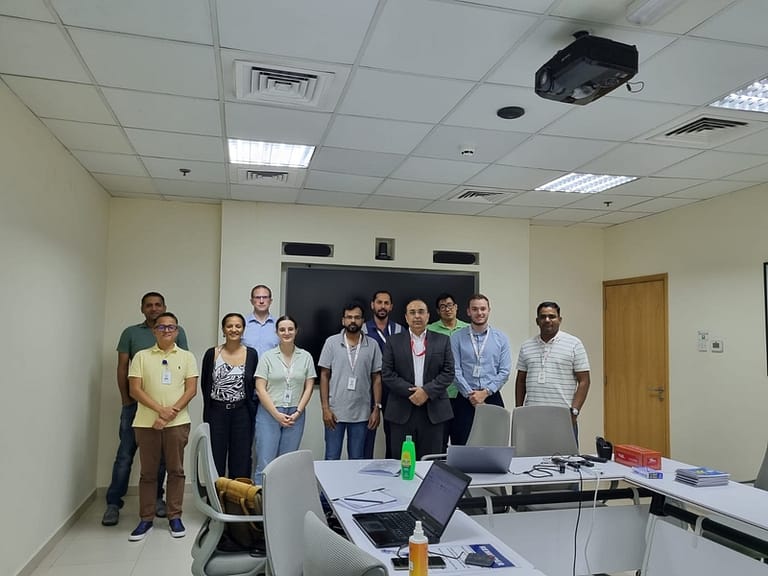Course Overview
PMI Risk Management Professional (PMI-RMP)® is a specialized credential offered by PMI to help professionals who want to specialize in project risk management. Prepare for the PMI Risk Management Professional (PMI-RMP)® certification exam through this 3-day instructor-led course in Dubai.
Gaining distinction as a PMI-RMP® sets you apart from other professionals and brings credit to your organization. Eighty-three percent of organizations that are high performers in project management practice risk management frequently while just 49 percent of low performers do so. The practice contributes to a handsome payoff: high performers meet their goals 2.5 times more often and waste 13 times less money than low performers, as found by our 2015 Pulse of the Profession® report.
There is a specific demand for Risk Managers from Banks & Oil & Gas companies in the UAE where the PMI-RMP Certification is an eligibility requirement.
Upcoming PMI-RMP Classes
| 📆 PMI-RMP Training Schedule: LIVE ONLINE | 📌Dec 18 📌Dec 19 📌Dec 20 📌Dec 21 📌Dec 25 📌Dec 26 |
| 📆 PMI-RMP Training Schedule: IN-PERSON CLASSROOM | 📌Jan 22 📌Jan 23 📌Jan 24 |
| 📆 PMI-RMP Training Schedule: IN-PERSON CLASSROOM | 📌Mar 25 📌Mar 26 📌Mar 27 |
Register for PMI-RMP Training
This PMI-RMP® training course will:
- Provide you a roadmap to prepare for and ace the PMI-RMP examination.
- Prepare delegates to sit for the PMI-RMP® Exam.
- Increase the likelihood of passing from the first attempt.
- Teach delegates about project risk management in details so they can apply it in their own work.
- Provide an opportunity to understand the risks inherent in projects and how to plan for them.
Introduction to Project Risk Management
- Risk Management in Projects
- Objectives of risk management
- Risk management and the project life cycle
Principles and Concepts of Risk Management
- Definition of risk & risk management
- Stakeholder risk attitudes
- Responsibilities for risk within projects
Introduction to PMI Risk Management Processes
- Stakeholder risk tolerance
- Overview of the risk management processes
Plan Risk Management
- Purpose of risk management planning
- Components of the risk management plan
- Success criteria for risk planning
- Barriers to successful risk planning
- Risk Breakdown Structures (RBS)
- Techniques for Risk Planning
- The Risk Management Plan
- Stakeholder Risk Tolerance
Identify Risks
- Purpose and objectives of Risk Identification
- Typifying risks
- Risk identification techniques
- Information Gathering Techniques
- Checklist Analysis
- Analyzing assumptions & constraints
- Diagramming Techniques
- Cause & Effect (Fishbone diagrams) for root-cause analysis
- Risk triggers
- The risk register
GROUP EXERCISE – HOW TO WRITE RISK STATEMENTS
Perform Qualitative Risk Analysis
- Purpose, objectives & Critical success factors
- Categorizing risks
- Risk probability and impact, Risk score
- Risk Matrix
GROUP EXERCISE – UPDATING RISK REGISTER
Perform Quantitative Risk Analysis
- Purpose, objectives & Critical success factors
- Accounting for risk inter-relations in projects
- Data Gathering & Representation techniques
- Modeling & Simulation, Probability distribution
- Monte Carlo Simulations, S-curve
- Tornado diagrams, sensitivity analysis, criticality analysis
- Decision trees
- Risk Expected Monetary Value (EMV) calculation
GROUP EXERCISE – UPDATING RISK REGISTER
Plan Risk Responses
- Risk owners, risk action owners
- Strategies for positive and negative risks
- Risk & contracting
- The risk response action plan
- Contingency planning, calculating the contingency fund
- Secondary & residual risks
GROUP EXERCISE – SELECTING THE RIGHT RISK RESPONSE
Monitor and Control Risk
- Risk re-assessment
- Risk Reviews
- Process improvement
- Managing contingency reserves
- Risk audits
GROUP EXERCISE – RISK REVIEW SESSIONS
- 30 Contact Hours Certificate (PDUs)
- PMI-RMP Book
- 3 PMI-RMP Practice Exams
- Lunch (If training is in a hotel)
- Secondary degree (high school diploma, associate’s degree, or the global equivalent)
- 4,500 hours of project risk management experience
- 40 hours of project risk management education
or
- Four-year degree (bachelor’s degree or the global equivalent)
- 3,000 hours of project risk management experience
- 30 hours of project risk management education



